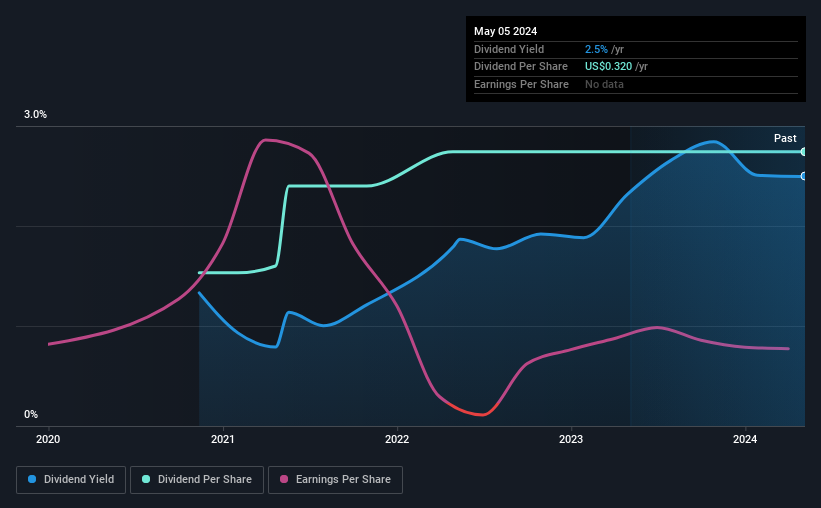BayFirst Financial (NASDAQ:BAFN) Will Pay A Dividend Of $0.08
The board of BayFirst Financial Corp. (NASDAQ:BAFN) has announced that it will pay a dividend of $0.08 per share on the 15th of June. The dividend yield is 2.5% based on this payment, which is a little bit low compared to the other companies in the industry.
View our latest analysis for BayFirst Financial
BayFirst Financial's Dividend Forecasted To Be Well Covered By Earnings
Even a low dividend yield can be attractive if it is sustained for years on end.
Having paid out dividends for only 3 years, BayFirst Financial does not have much of a history being a dividend paying company. Based on BayFirst Financial's last earnings report, calculating for its payout ratio equates to 27%, which means that the company covered its last dividend with comfortable room to spare.
Unless the company can turn things around, EPS could fall by 1.8% over the next year. If the dividend continues along recent trends, we estimate the future payout ratio could be 31%, which we consider to be quite comfortable, with most of the company's earnings left over to grow the business in the future.
BayFirst Financial Doesn't Have A Long Payment History
The dividend has been pretty stable looking back, but the company hasn't been paying one for very long. This makes it tough to judge how it would fare through a full economic cycle. Since 2021, the annual payment back then was $0.179, compared to the most recent full-year payment of $0.32. This implies that the company grew its distributions at a yearly rate of about 21% over that duration. It is always nice to see strong dividend growth, but with such a short payment history we wouldn't be inclined to rely on it until a longer track record can be developed.
The Dividend's Growth Prospects Are Limited
Investors could be attracted to the stock based on the quality of its payment history. Let's not jump to conclusions as things might not be as good as they appear on the surface. Unfortunately, BayFirst Financial's earnings per share has been essentially flat over the past five years, which means the dividend may not be increased each year.
In Summary
Overall, we don't think this company makes a great dividend stock, even though the dividend wasn't cut this year. The company hasn't been paying a very consistent dividend over time, despite only paying out a small portion of earnings. This company is not in the top tier of income providing stocks.
It's important to note that companies having a consistent dividend policy will generate greater investor confidence than those having an erratic one. Meanwhile, despite the importance of dividend payments, they are not the only factors our readers should know when assessing a company. For example, we've identified 3 warning signs for BayFirst Financial (1 is a bit concerning!) that you should be aware of before investing. Is BayFirst Financial not quite the opportunity you were looking for? Why not check out our selection of top dividend stocks.
Have feedback on this article? Concerned about the content? Get in touch with us directly. Alternatively, email editorial-team (at) simplywallst.com.
This article by Simply Wall St is general in nature. We provide commentary based on historical data and analyst forecasts only using an unbiased methodology and our articles are not intended to be financial advice. It does not constitute a recommendation to buy or sell any stock, and does not take account of your objectives, or your financial situation. We aim to bring you long-term focused analysis driven by fundamental data. Note that our analysis may not factor in the latest price-sensitive company announcements or qualitative material. Simply Wall St has no position in any stocks mentioned.

 Yahoo Finance
Yahoo Finance 
